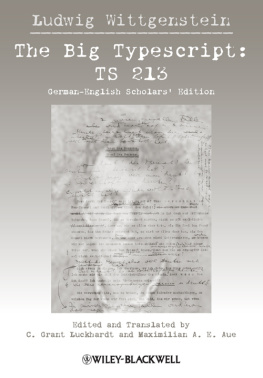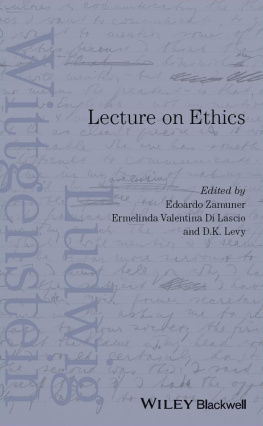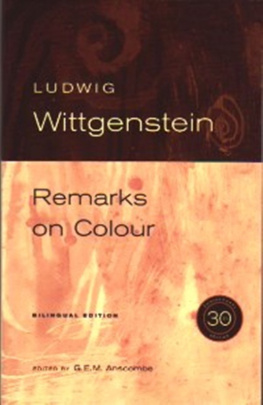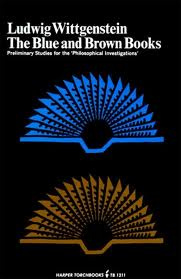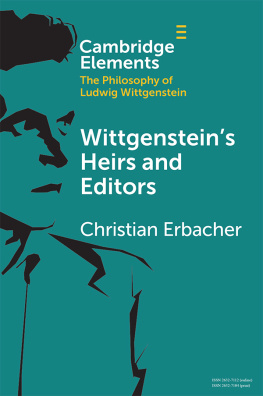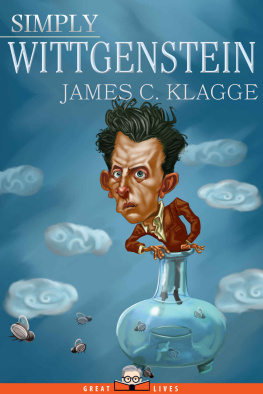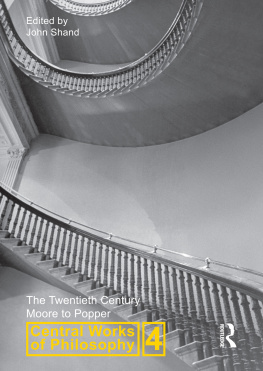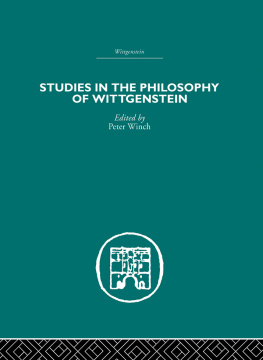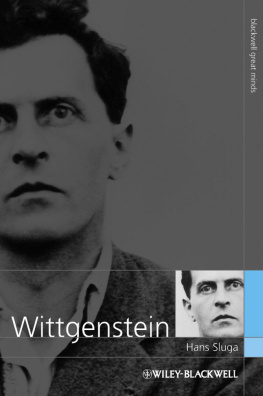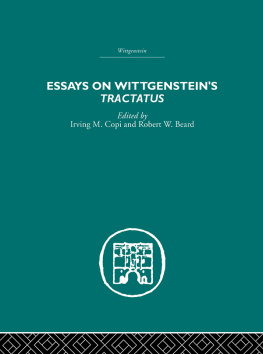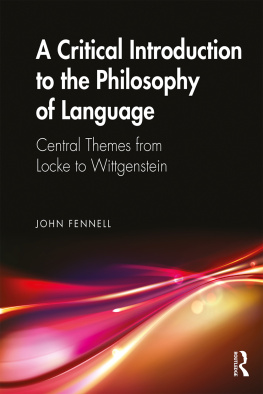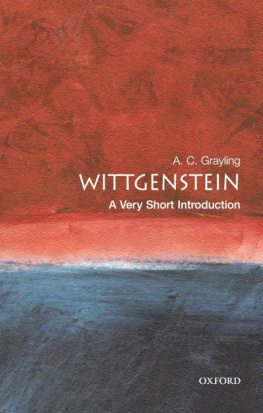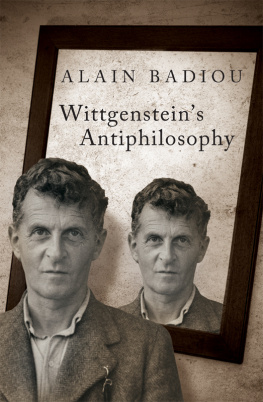Tractatus Logico-Philosophicus
Tractatus Logico-Philosophicus

Ludwig Wittgenstein
Translated by C. K. Ogden
With an Introduction by Bertrand Russell
DOVER PUBLICATIONS, INC.
Mineola, New York
Bibliographical Note
This Dover edition, first published in 1999, is an unabridged republication of the English translation by C. K. Ogden of the work originally written in German by Ludwig Wittgenstein and the Introduction by Bertrand Russell, published by Routledge & Kegan Paul Ltd in 1922. This edition includes the Index from the 1955 printing and a new Publishers Note.
Library of Congress Cataloging-in-Publication Data
Wittgenstein, Ludwig, 18891951.
[Tractatus logico-philosophicus. English]
Tractatus logico-philosophicus / Ludwig Wittgenstein; translated by C.K. Ogden; with an introduction by Bertrand Russell.
p. cm.
Originally published: London: Routledge & Kegan Paul, 1922, 1955 printing.
Includes index.
ISBN-13: 978-0-486-40445-5
ISBN-10: 0-486-40445-5
1. Logic, Symbolic and mathematical. 2. Language and languagesPhilosophy. I. Ogden, C. K. (Charles Kay),
18891957. II. Title.
B3376.W563T7313 1998b
Manufactured in the United States by Courier Corporation
40445506
www.doverpublications.com
PUBLISHERS NOTE
This translation of the German work that originally appeared in Ostwalds Amalen der Naturphilosophie, final number (1921), was carefully revised by the author himself. In addition, the philosopher and mathematician Frank P. Ramsay assisted C. K. Ogden with the translation.
Contents
INTRODUCTION
BY BERTRAND RUSSELL
MR WITTGENSTEINS Tractatus Logico-Philosophicus, whether or not it prove to give the ultimate truth on the matters with which it deals, certainly deserves, by its breadth and scope and profundity, to be considered an important event in the philosophical world. Starting from the principles of Symbolism and the relations which are necessary between words and things in any language, it applies the result of this inquiry to various departments of traditional philosophy, showing in each case how traditional philosophy and traditional solutions arise out of ignorance of the principles of Symbolism and out of misuse of language.
The logical structure of propositions and the nature of logical inference are first dealt with. Thence we pass successively to Theory of Knowledge, Principles of Physics, Ethics, and finally the Mystical (das Mystische).
In order to understand Mr Wittgensteins book, it is necessary to realize what is the problem with which he is concerned. In the part of his theory which deals with Symbolism he is concerned with the conditions which would have to be fulfilled by a logically perfect language. There are various problems as regards language. First, there is the problem what actually occurs in our minds when we use language with the intention of meaning something by it; this problem belongs to psychology. Secondly, there is the problem as to what is the relation subsisting between thoughts, words, or sentences, and that which they refer to or mean; this problem belongs to epistemology. Thirdly, there is the problem of using sentences so as to convey truth rather than falsehood; this belongs to the special sciences dealing with the subject-matter of the sentences in question. Fourthly, there is the question: what relation must one fact (such as a sentence) have to another in order to be capable of being a symbol for that other? This last is a logical question, and is the one with which Mr Wittgenstein is concerned. He is concerned with the conditions for accurate Symbolism, i.e. for Symbolism in which a sentence means something quite definite. In practice, language is always more or less vague, so that what we assert is never quite precise. Thus, logic has two problems to deal with in regard to Symbolism: (1) the conditions for sense rather than nonsense in combinations of symbols; (2) the conditions for uniqueness of meaning or reference in symbols or combinations of symbols. A logically perfect language has rules of syntax which prevent nonsense, and has single symbols which always have a definite and unique meaning. Mr Wittgenstein is concerned with the conditions for a logically perfect languagenot that any language is logically perfect, or that we believe ourselves capable, here and now, of constructing a logically perfect language, but that the whole function of language is to have meaning, and it only fulfils this function in proportion as it approaches to the ideal language which we postulate.
The essential business of language is to assert or deny facts. Given the syntax of a language, the meaning of a sentence is determinate as soon as the meaning of the component words is known. In order that a certain sentence should assert a certain fact there must, however the language may be constructed, be something in common between the structure of the sentence and the structure of the fact. This is perhaps the most fundamental thesis of Mr Wittgensteins theory. That which has to be in common between the sentence and the fact cannot, so he contends, be itself in turn said in language. It can, in his phraseology, only be shown, not said, for whatever we may say will still need to have the same structure.
). What is complex in the world is a fact. Facts which are not compounded of other facts are what Mr Wittgenstein calls Sachverhalte, whereas a fact which may consist of two or more facts is called a Tatsache: thus, for example, Socrates is wise is a Sachverhalt, as well as a Tatsache, whereas Socrates is wise and Plato is his pupil is a Tatsache but not a Sachverhalt.
He compares linguistic expression to projection in geometry. A geometrical figure may be projected in many ways: each of these ways corresponds to a different language, but the projective properties of the original figure remain unchanged whichever of these ways may be adopted. These projective properties correspond to that which in his theory the proposition and the fact must have in common, if the proposition is to assert the fact.
In certain elementary ways this is, of course, obvious. It is impossible, for example, to make a statement about two men (assuming for the moment that the men may be treated as simples), without employing two names, and ).
Mr Wittgenstein begins his theory of Symbolism with the statement ().
We speak of a logical picture of a reality when we wish to imply only so much resemblance as is essential to its being a picture in any sense, that is to say, when we wish to imply no more than identity of logical form. The logical picture of a fact, he says, is a Gedanke. A picture can correspond or not correspond with the fact and be accordingly true or false, but in both cases it shares the logical form with the fact. The sense in which he speaks of pictures is illustrated by his statement: The gramophone record, the musical thought, the score, the waves of sound, all stand to one another in that pictorial internal relation which holds between language and the world. To all of ). In accordance with this principle the things that have to be said in leading the reader to understand Mr Wittgensteins theory are all of them things which that theory itself condemns as meaningless. With this proviso we will endeavour to convey the picture of the world which seems to underlie his system.
The world consists of facts: facts cannot strictly speaking be defined, but we can explain what we mean by saying that facts are what make propositions true, or false. Facts may contain parts which are facts or may ). The assertion that there is a certain complex reduces to the assertion that its constituents are related in a certain way, which is the assertion of a
Next page

